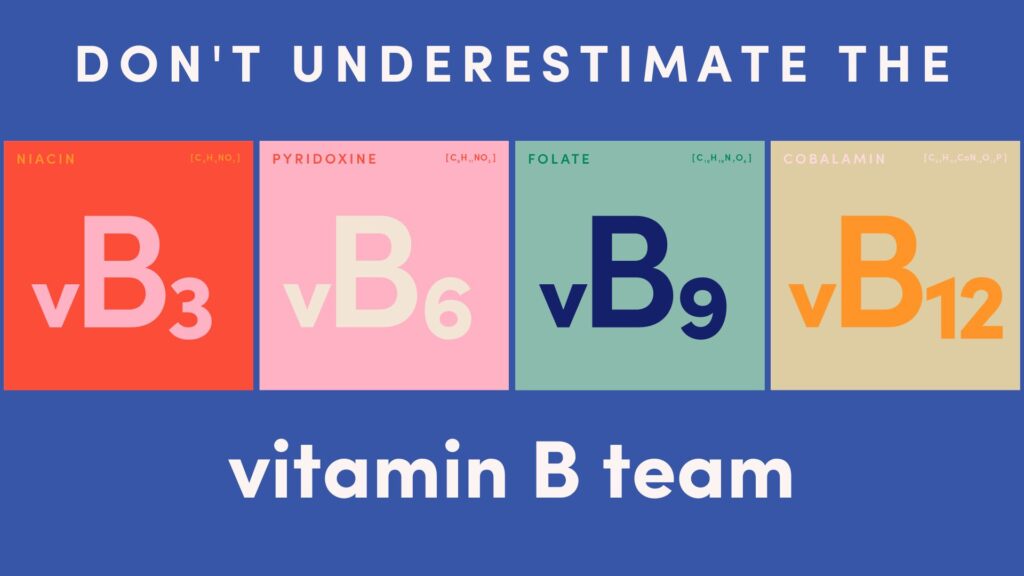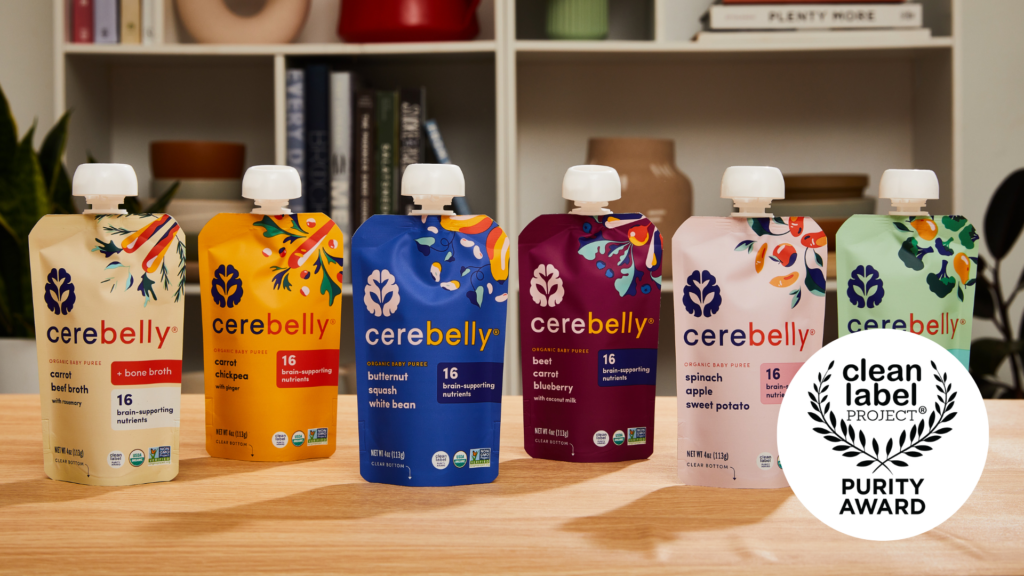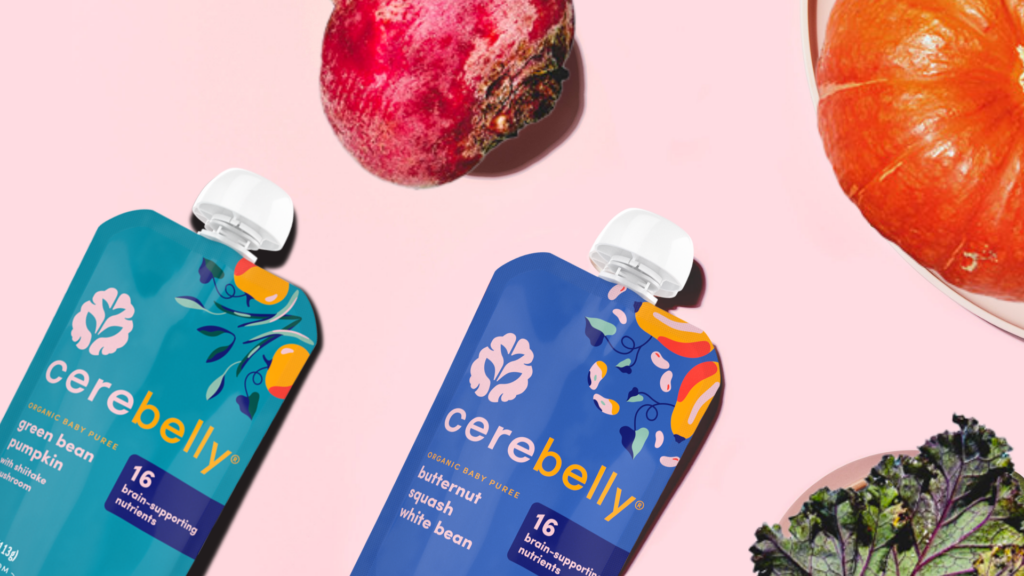Don’t Underestimate the (Vitamin) B Team
*Disclaimer: this article is not meant to be individual medical/nutrition advice but for education purposes only. Each child’s nutritional needs are different.
B vitamins aren’t given much attention. They’re a group of vitamins that quietly do the grunt work to create energy from food we eat. They play an important role in brain development, including cognition and motor development. Some are essential in the creation of DNA and help prevent birth defects. Deficiencies are rare but can have serious neurological consequences.
I know, I know, calling them the ‘B’ team is a little degrading, but listen, I’m holding a mild grudge that their names are confusingly laid out. Did you know that even though there is a vitamin B’12’, there are only a total of eight B vitamins?
B1 (thiamine), B2 (riboflavin), B3 (niacin), B5 (pantothenic acid), B6 (pyridoxine), B7 (biotin), B9 (folic acid), B12 (cobalamin). What happened to B4, B8, B10, B11?? A little off topic, but they are not technically vitamins, so they get left out of even the ‘B’ Team’.
This article will help you understand why B vitamins are so important for your baby's brain development.

Brain Building B vitamins
Of the eight B vitamins, there are four that are essential for brain development in babies and toddlers in their first 1000 days of life. This is a critical window of time in which different regions of the brain are developed. Here’s a little overview of what each one is responsible for:
B3 – niacin — Vitamin B3 isn’t a well-known nutrient but it works hard to metabolize energy from the food we eat into energy for our body. Vitamin B3 supports the development of babies cerebellum, a region of the brain responsible for balance and motor coordination.
B6 –pyridoxine —- Vitamin B6 is used by the cells to perform many different functions involved in metabolism, particularly protein metabolism. This means that it plays an important role in converting the protein we get from food into energy for all sorts of everyday functions. It’s essential for brain development because it helps make chemicals in the brain needed for cells to communicate with each other, and it supports a healthy immune system.
B9 – folate (folic acid) –— Folate is the naturally occurring form found in food. Folic acid is the form found in enriched food and supplements. This vitamin is essential for synthesizing DNA (the genetic make-up of your cells) to form new cells in the body and supports areas of the brain involved in balance, muscle coordination, motor and sensory functions. Folate daily requirements for a 12 month old are double the daily requirement for a 6 month old, so it’s important for older infants to get some from their food.
For healthy adults, a well-rounded diet full of whole grains and vegetables/fruit, and food enriched with folic acid is how to meet folate requirements. But if you’re pregnant, trying to become pregnant, or of childbearing age and could become pregnant — your body needs more of this important B vitamin. Boosting your normal intake of folate with a folic acid supplement can help prevent certain birth defects having to do with the brain and spinal cord. Talk to your doctor about what’s right for you.
B12 – cobalamin —– Vitamin B12 helps keep the nervous system working properly. It’s important for making healthy blood cells and DNA. Vitamin B12 is mostly found in animal products (with very few exceptions); therefore, vegetarians and vegans need to pay special attention to this crucial nutrient. Vegan sources are chlorella, nutritional yeast and fortified vegan products. Furthermore, enriched wheat products are NOT generally fortified with vitamin B12, as they are with B1,B2,B3 and B9. If you are vegan and breastfeeding, see your healthcare provider for advice on vitamin B12 supplements.
Here’s how to get enough brain building B vitamins in your baby’s diet:

Vitamin B3
Dietary requirements*:
Age – Vitamin B3 (mg)
7-12 months – 4mg
1-3 years – 6mg
*Dietary Reference Intakes (DRI). Shown here only to demonstrate how many servings of food may be needed to meet requirements. Keep in mind that breast milk, formula, and enriched wheat products also offer vitamin B3.
Examples of Food Sources Amount of vitamin B3 (mg)
½ cup peas 1.1mg
¼ cup squash seeds 1.6mg
1 oz chicken 3mg
1 oz beef 2.2mg
1 oz salmon 2.8mg
1 pouch Cerebelly Pea Basil 2mg

Vitamin B6
Dietary requirements*:
Age – Vitamin B6 (mg)
7-12 months – 0.3mg
1-3 years – 0.5mg
*Dietary Reference Intakes (DRI). Shown here only to demonstrate how many servings of food may be needed to meet requirements. Keep in mind that breast milk, formula, and enriched wheat products also offer vitamin B6.
Examples of Food Sources Amount of vitamin B6 (mg)
¼ cup chickpeas 0.13mg
½ cup raw spinach 0.03mg
½ cup sliced mango 0.1mg
¼ avocado 0.1mg
1 pouch Cerebelly Sweet Potato Mango 0.2mg

Vitamin B9 (folate)
Dietary requirements*:
Age – Folate (mcg)
7-12 months – 80mcg
1-3 years – 150mcg
*Dietary Reference Intakes (DRI). Shown here only to demonstrate how many servings of food may be needed to meet requirements. Keep in mind that breast milk, formula, and enriched wheat products also offer folic acid.
Examples of Food Sources Amount of folate (mcg)
½ cup raw spinach 30mcg
¼ cup cooked spinach 65mcg
1 orange 35mcg
¼ avocado 30mcg
¼ cup cooked lentils 90mcg
½ cup cooked broccoli 85mcg
1 pouch Cerebelly Broccoli Pear 72mcg

Vitamin B12 (cobalamin)
Dietary requirements*:
Age – Vitamin B12 (mcg)
7-12 months – 0.5mcg
1-3 years – 0.9mcg
*Dietary Reference Intakes (DRI). Shown here only to demonstrate how many servings of food may be needed to meet requirements. Keep in mind that breast milk and formula also offer vitamin B12. Have a look at the description of vitamin B12 above for more info on this.
Examples of Food Sources Amount of vitamin B12 (mcg)
1 oz beef 0.5mcg
1 egg 0.5mcg
1 tsp nutritional yeast 6mcg
1 oz cheese 0.04mcg
1 oz salmon 1mcg
1 pouch Cerebelly 0.2mcg
About
the author
Stacey Segal BScA, MSc, RD

Stacey is a pediatric dietitian and a mom of two little eaters. Her career has been dedicated to nourishing babies, toddlers and kids. She’s a staff dietitian at The Hospital for Sick Children, Toronto, specializing in neuroscience. Stacey is also the founder of the Prenatal and Pediatric Nutrition Clinic at GSH Medical, and a nutrition writer for AboutKidsHealth website. Being a mom herself, she has experienced the challenges that come with feeding kids. She’s passionate about helping families raise well nourished kids right from the start!
Have more questions? Send us an email at support@cerebelly.com and we will be sure to get back to you!



